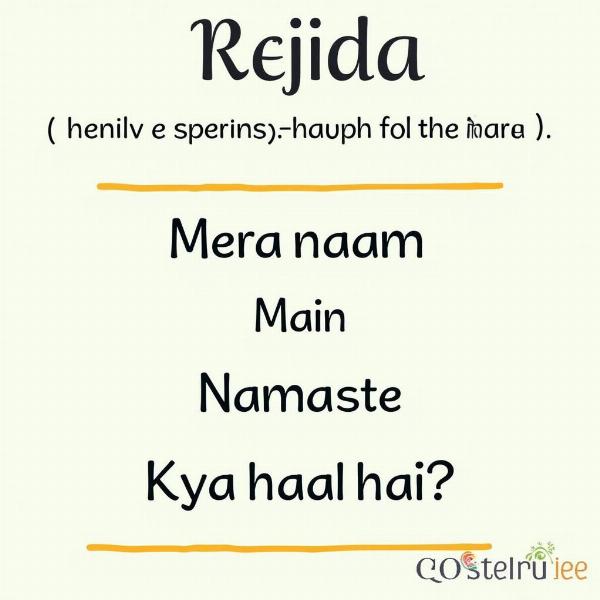Understanding how to introduce yourself in Hindi is a crucial first step in communicating with Hindi speakers. “My name is” in Hindi isn’t a direct, word-for-word translation. The nuances of the language require a slightly different approach. This article will explore the various ways to say “my name is” in Hindi, catering to different levels of formality and cultural contexts. We’ll also delve into common greetings and pronunciation tips to ensure you make a positive first impression.
Introducing Yourself: Formal vs. Informal
There are several ways to express “my name is” in Hindi, and the best choice depends on the situation. For formal settings, like a business meeting or addressing someone older, “Mera naam … hai” (मेरा नाम … है) is appropriate. “Mera” (मेरा) means “my,” “naam” (नाम) means “name,” and “hai” (है) is the present tense form of “to be.” For example, “Mera naam Amit hai” (मेरा नाम अमित है) translates to “My name is Amit.”
In informal settings, with friends or family, you can use “Main … hoon” (मैं … हूँ). “Main” (मैं) means “I,” and “hoon” (हूँ) is another form of “to be.” So, “Main Amit hoon” (मैं अमित हूँ) also means “My name is Amit,” but it’s more casual.
Pronunciation and Common Greetings
Correct pronunciation is essential for effective communication. Practice saying “Mera naam” (मेरा नाम) and “Main” (मैं) clearly. Remember that the emphasis often falls on the first syllable. Combine your introduction with a polite greeting like “Namaste” (नमस्ते), a respectful gesture used throughout India. Other greetings include “Namaskar” (नमस्कार), which is more formal, and “Kya haal hai?” (क्या हाल है?), meaning “How are you?” in a casual context.
 Pronunciation Guide and Common Greetings in Hindi
Pronunciation Guide and Common Greetings in Hindi
Beyond “My Name Is”: Expanding Your Hindi Vocabulary
Once you’ve mastered the basics, you can enhance your introduction by adding more details. For example, you could say, “Mera naam Amit hai, aur main ek engineer hoon” (मेरा नाम अमित है, और मैं एक इंजीनियर हूँ), which means “My name is Amit, and I am an engineer.” “Aur” (और) means “and.” Learning basic vocabulary related to professions, hobbies, and origins can enrich your conversations.
What if I forget how to say “My name is” in Hindi?
Don’t worry! If you momentarily forget the Hindi phrase, you can always use English. Most people in urban areas understand basic English. You can say, “My name is Amit,” and then try to incorporate Hindi phrases as you remember them. The key is to be respectful and make an effort to communicate.
How do I address someone respectfully in Hindi?
Respectful address in Hindi often involves using honorifics like “Ji” (जी) after a person’s name. For example, “Amit Ji” (अमित जी) shows respect. You can also use “Aap” (आप) instead of “Tum” (तुम) when addressing someone older or in a formal setting, as “Aap” is the formal “you.” Understanding these nuances can greatly enhance your interactions.
Conclusion
Learning how to say “my name is” in Hindi opens doors to connect with the rich culture and people of India. Mastering the phrases “Mera naam … hai” and “Main … hoon,” along with common greetings and pronunciation, empowers you to confidently introduce yourself in various settings. Remember, even a few basic Hindi phrases can make a significant difference in your interactions, showing respect and fostering positive communication.
FAQ
- What is the most formal way to say “My name is” in Hindi? The most formal way is “Mera naam … hai” (मेरा नाम … है).
- Can I use English if I forget the Hindi phrase? Yes, you can use English, but try to incorporate Hindi phrases as you remember them.
- What does “Namaste” mean? “Namaste” (नमस्ते) is a respectful greeting widely used in India.
- How do I say “How are you?” in Hindi? You can say “Kya haal hai?” (क्या हाल है?) in an informal setting or “Aap kaise hain?” (आप कैसे हैं?) in a formal setting.
- What are some other useful Hindi phrases for introductions? Learning phrases like “Aap se milkar khushi hui” (आप से मिलकर खुशी हुई) meaning “Nice to meet you” can be helpful.
Meaning-Hindi.in is your trusted partner for accurate and culturally sensitive Hindi translations. We offer a range of professional translation services, from business and legal documents to website localization and technical manuals. Whether you need quick turnaround times or specialized expertise, our team is dedicated to delivering high-quality translations that bridge language barriers. Contact us at [email protected] or +91 11-4502-7584 for all your Hindi translation needs. Meaning-Hindi.in is committed to helping you communicate effectively and respectfully in Hindi.